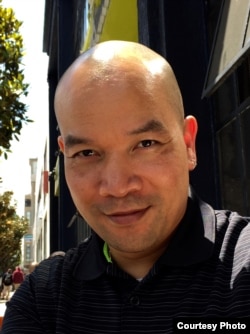For filmmaker Michael Siv, the idea of justice for survivors of the Khmer Rouge era is difficult to pin down, a question that might never be answered.
As part of his “ongoing journey,” as he puts it, to come to terms with his own past and the history of his native country, Siv—who moved to the United States as a Cambodian refugee in the early 1980s—has produced “Daze of Justice.” The 69-minute documentary just premiered as a centerpiece film at the Center for Asian American Media Festival, which started on March 10 and runs for 10 days in San Francisco and Oakland, California.
“Daze of Justice” tells the extraordinary story of three courageous Cambodian-American Khmer Rouge survivors who are also seeking answers. They come to testify at the Khmer Rouge Tribunal in Phnom Penh, taking the stand in front of top leaders of the regime, two of whom have been convicted of crimes against humanity and are on still on trial on genocide charges.
Siv told VOA Khmer the film was dedicated to the survivors of the Khmer Rouge, and that it was in part an exploration of what justice might mean for them.
“What is justice?” he asked. “When I started following them, I don’t know what it is. So my goal is to capture if there is such a thing as justice, through the lenses of survivors.”
There is no clear answer, for Siv himself or the survivors featured in the film, he said. “That’s why I’m using the word ‘Daze’ of Justice, because it’s going to be ongoing question and ongoing journey, probably for the rest of most people’s lives,” he said.
The journey of the three survivors was the starting point for the film. However, Siv said, he came to realize that story of the Khmer Rouge genocide was not just about perpetrators and survivors. “The message of the film is that genocide, or this war, didn’t necessarily [just] affect the first generation or the survivors. It affected people like myself, and probably the next generation: my son, and probably his family,” he said.
Seeking an Untold Story
At the age of three or four, Siv and his mother, father and older brother escaped the chaos inside Cambodia to one of the camps on the Thai-Cambodian border. His father told his young mother, then aged only 18, to take Siv and seek refuge in America, leaving their family members behind.
He’s now in his early 30s, but in his youth Siv never attempted to find the truth of what had happened to the rest of his family. “At home, even my mother never talks about her past because it is just too painful or [full of] suffering,” he said.
When he was 24, Siv learned that his father and brother were still alive, and decided to return to Cambodia. But his father had kept two families at the same time when they were living in the Thai-Cambodia border camp. His father chose to remarry to the other woman, with whom he has eight children. Siv was shocked to find that his brother lives only about 25 minutes away from their father, but the two did not know each other.
“It’s unbelievable. I didn’t know why,” he said. “And now I realize that it’s beyond the war. My father was like: ‘It is the war. Don’t blame me. Don’t blame your mother. Blame the Khmer Rouge.’”
Siv came to appreciate that his father, mother and other survivors, can never fully let the past go. “It’s going to be within them for the rest of their lives. They are going to continue to search [for] justice and closure,” said Siv.
A Story for Every Generation
In his film, Siv makes an interesting transition, turning his lens in an unexpected direction. He shifts from survivors, who lost loved ones and suffered extreme torment at the hands of the Khmer Rouge, to the son of one of the regime’s most ruthless killers.
Pheng, the offspring of the S-21 prison chief Kaing Kek Eav a.k.a. Duch, joins the film’s search for answers. He wants to find out more about his father, who was convicted of crimes against humanity in 2010, and is serving a life sentence.
“Pheng is coming to try to understand what his father is really about. But it becomes confusing for him when going to the trial with survivors,” he said.
“[Pheng] didn’t kill anybody, but his father did. How does a son of a mass murderer deal with that? Nobody talks about his story. Nobody tries to understand how difficult his life was growing up as a son of a mass murderer.”
Upon completing “Daze of Justice”, Siv said he realized the history of the Khmer Rouge belongs to all generations of Cambodians, both inside and outside the country. “The message is that every generation has to realize that the history is also theirs,” he said, “and it’s okay to talk about it.”









